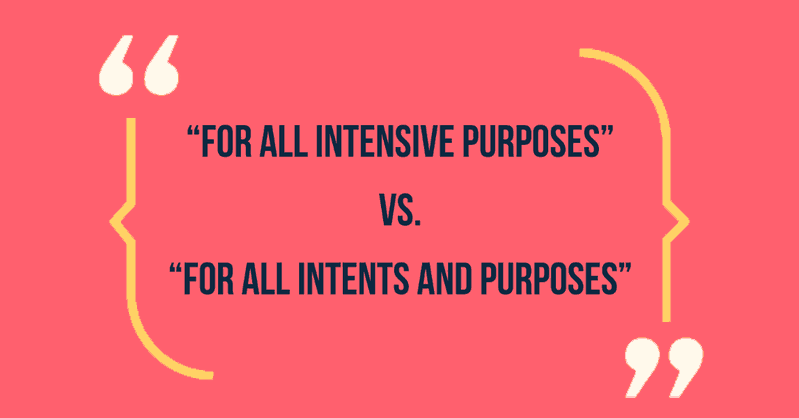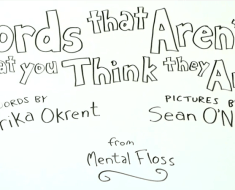We all do it. We all say phrases that we feel are correctly being said, but in reality are flat out being said wrong. Luckily, not everyone knows the exact wording that many of these phrases entail, so we get away with it! However, there is always that one person who catch you and make you feel like a complete idiot!
Have no fear, we got your back and below you will find common phrases that many of us say and their correct wording and meanings!
The following is brought to you by workandmoney.com
1. “For all intensive purposes” versus “For all intents and purposes”

Source | WorkandMoney.com
Intensive indicates that something is powerful and focused. If you’re discussing an intensive purpose, you’re simply indicating one focused purpose, or perhaps a few very focused purposes. The more common phrases, for all intents and purposes, indicates that something is coming from more or less all important angles or opinions. So for all intents and purposes, all intensive purposes is a usually the wrong thing to say.
2. “I could care less” versus “I couldn’t care less”
This is an extremely commonly misused phrase. While most people love to throw out that they “could care less” in an attempt to show how little they care about an issue, they’re actually communicating the opposite of the usual phrase’s intention. When you stop to think about what you’re saying, “could care less” means you not only care, but you care enough that you would have the ability to care less if you wanted to. If you’re trying to convey apathy, saying “I couldn’t care less” is much more accurate.
3. “One in the same” versus “One and the same”
When you and a friend are discussing two different instances that you realize happened with the same person, you’re discussing one and the same person. It’s hard to determine what one in the same thing might mean, since “one” is a noun yet “the same” isn’t exactly a specific location for that noun to go.
6. “Self-depreciating” versus “Self-deprecating”
Don’t give yourself another reason to be self-deprecating about your colloquial abilities by using the incorrect phrase “self-depreciating.” Depreciation is an economic term to indicate that something is losing value. Though you can deprecate and be hard on yourself, by pointing out your flaws you’re not automatically losing any human value.
7. “Irregardless” versus “Regardless”
Despite the fact that irregardless is technically in the dictionary, it is not a word most folks will ever need. To be fair, the phrase “tl; dr” (which means ‘too long; didn’t read’ for any non-Redditors out there) is also in the dictionary. Sometimes, colloquial words or phrases are added to the dictionary to reflect the fact that people are using them and to help other people understand what they might be saying.
But irregardless remains rather nonsensical (and repetitive), regardless of its place in the dictionary.
8. “Jive with” versus “Jibe with”
You’re more than welcome to jive with something. But just know that, at least in most business settings, you probably mean you jibe with it, not jive. To jive is a much more playful, often musical verb. But to jibe with something means you’re getting along with or understanding it. To jive with something means you’re likely spitting hot scat in the basement of a musical jazz club. So if that doesn’t jibe with what you’re trying get across, don’t use it.
9. “Tongue and cheek” versus “Tongue in cheek”
It may be tongue in cheek to try and get another person to say tongue and cheek, since you’ll be insincerely attempting to get someone to say something meaningless. When something is said tongue in cheek, there’s a feeling of exaggeration, sarcasm, or irony involved. When something is said tongue and cheek, well, it can really only mean that two facial organs were involved.
10. “Make do” versus “Make due”
Both of these phrases are perfectly useful in different situations. If you want to make do with something, you’re getting by with whatever you have. Making due means creating a deadline or due date for something. So if an employer hasn’t made a specific project due and isn’t giving you the resources you need to do it properly, you make do with what you have and finish it whenever you want.
11. “Nip it in the butt” versus “Nip it in the bud”
Let’s nip this commonly misused phrase in the bud right now. The origins of this phrase come from the idea of de-budding flowers. So there were actual buds involved. So think twice before you change that “bud” to a “butt” because you’ll be communicating something completely (and embarrassingly) different.
12. “Shoe-in” versus “Shoo in”
The difficult element of this phrase is that the wrong phrase (shoe in) has a really powerful visualization that makes it feel right. To say that someone has a “shoe in” to win feels like you’re trying to say they’ve already got their foot in the door (another common phrase). The actual phrase is a “shoo in” dates back to horse racing days when you could urge – or shoo – something towards victory.
13. “Piece of mind” vs “Peace of mind”
When you want to give yourself peace of mind, you might consider giving someone who upset you a piece of your mind. And though they’re said the same, their spelling indicates two very different meanings. Peace of mind is what comes when you know the conclusion or outcome of something, often indicating something positive has resulted. Piece of mind is sharing a bit of your own thoughts with another person, and is often done when someone has upset or frustrated you. So if you’re emailing your boss to give them peace of mind, be sure it doesn’t include an angry piece of your mind.
14. “Peek interest” versus “Peak interest” versus “Pique interest”
All three versions of this same-sounding word seem like they could work properly to indicate getting interested in something. But piqued actually means to excite or create interest or curiosity in. So, sure, you could technically peek at something interesting if you’re sneaking around. And you could also have reached your peak level of interest on a topic before wanting to move onto something else. But in terms of something piquing your interest, be sure to use this version of the phrase.
15. “Do good” versus “Do well”
The good and well debate is one that grammar lovers enjoy getting into regularly. It employs all sorts of juicy discussions about using adverbs instead of adjectives. To keep it simple, just remember that if you’re doing good, you’re likely giving generously to those around you. If you want to show that something was done properly or up to agreed upon standards, it was done well. So, Mother Teresa did good. And she did her job well.
16. “Nerve-wrecking” versus “Nerve-wracking”
Trying to use the phrase nerve-wracking correctly can cause you to be a nervous wreck. Perhaps that’s why so many people jump to the conclusion that nerve-wrecking and nerve-wracking are the same things.
The proper way to say your nerves are standing on end is that the situation is nerve-wracking. You can also use nerve-racking, since wracking and racking are essentially interchangeable.
For more common phrases and what they truly mean…head over to workandmoney.com!










